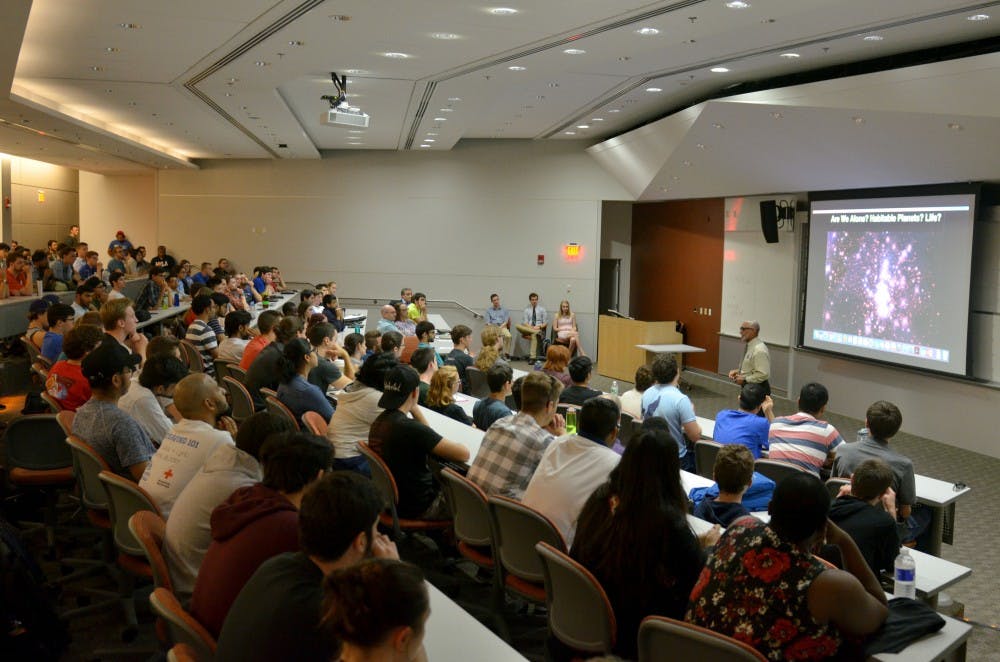Charles Bolden loved working for NASA because he turned science fiction into science fact every day.
Over 100 people gathered in 101 Davis Hall on Monday evening to hear the former NASA Administrator speak. Students packed the room, filling every seat, spilling into aisles and crouching in back corners. Bolden served as the keynote speaker for the School of Engineering and Applied Sciences’ Space Week. Bolden discussed the components of NASA, Mars exploration, plans for future expeditions and the possibility of life in outer space.
Bolden, a retired U.S. Marine Corps Major General, was informal and unpretentious. His presentation was peppered with “Saturday Night Live” jokes, pop culture references and football analogies. He made complex scientific information accessible and fun for the audience.
“NASA is actually a little organization,” Bolden said. “It does a lot of things so people think it’s huge, but they have about 17,000 employees around the world.”
There are nine different NASA centers around the country, plus one federally funded research and development facility in Pasadena, California, according to Bolden.
NASA has four main directives: space operations, aeronautics research, science mission and space exploration. Space operations creates the equipment required to go to Mars and fly spacecraft. Aeronautics focuses on aviation, and is currently working on five aircrafts, including an electronic airplane. The science mission directive uses space to better understand life on Earth.
And space exploration focuses on “the entire universe,” Bolden said.
Are we alone? Are there other habitable planets? Is there life on other planets? These are some of the questions the space exploration directive explores, according to Bolden. Bolden believes Mars likely has or had life in the past and can potentially sustain life today or in the future.
Bolden hopes manned explorations of Mars will start in the 2030s. He said there are three main factors that will determine whether or not that happens; firstly, he said, if you care about Mars exploration, you have to vote for public officials who support NASA funding; secondly, the President has to support it; and lastly, Congress has to support the initiative.
What that ultimately boils down to, Bolden said, is people have to care about space. People have to understand the importance of space exploration and research.
“We believe when we finally send people to Mars we will learn more about our own planet Earth that we know today,” Bolden said.
Bolden scoffed at Pluto’s demotion to a dwarf planet. He pointed out that it has ice and massive mountains that are bigger than Earth’s.
“It ought to be a planet. It’s got more good stuff than Earth in many cases, yet we call it a dwarf,” Bolden said.
Junior aerospace engineering major Maura Sutherland helped organize the event through Students for Exploration and Development of Space (SEDS). She also believes it is important to support NASA and learn about space exploration.
“So much of the science and technology we have today has either directly or inadvertently come from NASA’s work. Anything from the electronics that’s in your phone to cancer research – across the board there has been so much advancement because of NASA,” Sutherland said.
She also feels curiosity about space is simply a facet of the human condition.
“I think it’s sort of human nature to ask the questions and want to know what’s out there and sort of the big question of what is our purpose,” Sutherland said. “I’m not a philosophy major, but space and space exploration are pretty philosophical in certain lights.”
Sophomore computational physics and political science major Zayne Sember feels people should care about space because it has the power to bring people together in this political divisive time.
“Space is something that should bring people together,” Sember said, “I’m a [political science] major, so I see a lot of division and the international cooperation we see at the international space station is an example of how space can unite all of us.”
Maddy Fowler is an assistant features editor and can be reached at maddy.fowler@ubspectrum.com





